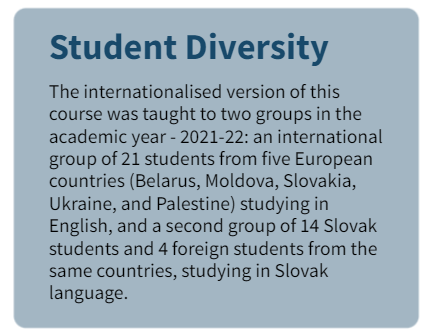Better health through nutrition
Course Summary:
The course "Essentials of Physiological and Clinical Nutrition" is offered at Comenius University in Bratislava for 4th-year medical students. It aims to equip students with skills to evaluate patient diets and design appropriate dietary recommendations for health and disease prevention. The course focusses on nutrition as a crucial factor in maintaining health and preventing diseases. Taught in both Slovak and English language programs, the course is now a standard offering in the medicine curriculum. The 12-week course is conducted online through MS Teams, with 100-minute sessions once a week, emphasizing practical guidance for future medical practitioners in guiding patients towards better health through nutrition.
Course Design:
- International and Interdisciplinary Perspectives
Essentials of Physiological and Clinical Nutrition actively integrates an international and intercultural dimension to cater to its diverse student population. The curriculum emphasizes geographical and cultural specifics of nutrition, and peer learning is adopted to foster communication, knowledge sharing and self/peer assessment. The course promotes international perspectives by engaging students in peer learning within mixed nationality groups, encouraging discussions on international nutrition aspects, and prompting students to investigate country-specific dietary patterns and nutrition-related issues. The final written assignment's assessment criteria also consider the international context, enhancing the course's relevance to a globalized healthcare landscape.
- Active Teaching Methodologies

With increased patient mobility in the world today, the course focusses to equip students with analytical and communication skills to help provide effective nutritional counseling.
Lessons begin with a short lecture, followed by students presenting two topics during the course: one assigned by the teacher (5-7 minutes) and another chosen by the student from a list of topics (10-15 minutes), with both presentations contributing to the final grade.
Students work in purposefully formed small groups of different nationalities, learning by solving clinical cases together. They analyze patients' diets and design personalized dietary recommendations, considering medical history, social, and cultural aspects alongside expert guidelines and scientific evidence. Students then present the results of their analysis, following which students offer their feedback and exchange opinions on how to best address the nutritional problem during a plenary discussion. This approach foregrounds peer learning and prepares students to adapt their nutritional advice and communicate to patients from varied cultural backgrounds and different parts of the world.
- Formative Assessments and Feedback
Assessments involve three components: class participation, two presentations, and a final written assignment designing a dietary information leaflet for a patient. Teachers foster a safe atmosphere for students to contribute freely, offering praise for good comments and constructive feedback. The course curriculum is also adapted based on student interests, allowing them to choose their own presentation topics. Feedback from students is valued and has been utilized for refining the course further.
In the following video, you can watch designers of the course explain their motivations, processes and experiences of implementing the course:
Contact:
Assoc. prof. Katarína Babinská, MD, PhD., MSc.
